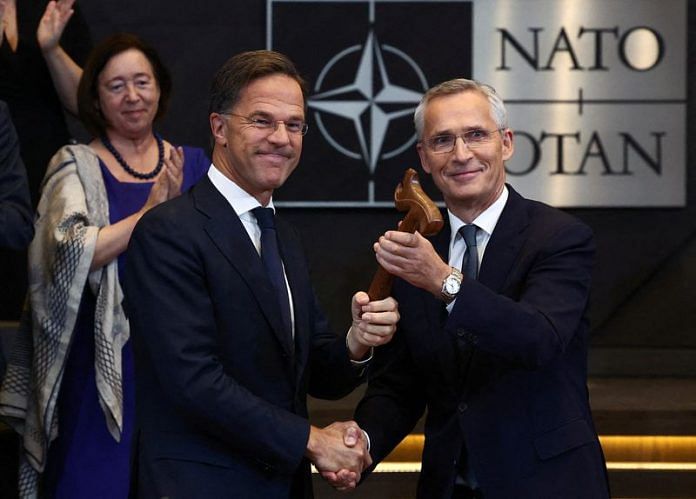By Andrew Gray and Lili Bayer
BRUSSELS (Reuters) -NATO’s new chief Mark Rutte voiced strong support for Ukraine on Tuesday and said he was not worried about the upcoming U.S. presidential election as he could work with either candidate.
Rutte took over from Jens Stoltenberg as NATO secretary general on Tuesday just weeks before the U.S. presidential vote that pits Democratic Vice President Kamala Harris against Republican Donald Trump, who has been critical of NATO.
Trump has also declined to say whether he wants Ukraine to win the war against Russia’s invasion.
“We have to make sure that Ukraine prevails as a sovereign, independent, democratic nation,” former Dutch prime minister Rutte told reporters at NATO headquarters in Brussels.
The war in Ukraine has put NATO – founded in 1949 to deter and defend against any attack on Western Europe by the Soviet Union – back at the centre of international affairs.
Rutte played down concerns within the transatlantic alliance about the vote in NATO’s predominant power, saying: I’m not worried. I know both candidates very well”.
“I worked for four years with Donald Trump. He was the one pushing us to spend more (on defence), and he achieved because indeed, at the moment, we are now at a much higher spending level than we were when he took office,” Rutte added.
“Kamala Harris has a fantastic record as vice president. She’s a highly respected leader, so I will be able to work with both,” he said.
NATO officials and diplomats expect Rutte to maintain Stoltenberg’s priorities – rallying support for Ukraine, pushing NATO countries to spend more on defence and keeping the U.S. engaged in European security.
Stoltenberg, a former prime minister of Norway, stepped down as boss of the 32-member alliance after a turbulent decade marked above all by Russia’s 2022 invasion of Ukraine.
Sweden and Finland abandoned long traditions of non-alignment to join NATO’s ranks and benefit from its collective defence clause, under which an attack on one member is considered an attack on all.
The war also prompted NATO to send thousands more troops to its eastern flank and to radically revamp its defence plans to take the possibility of an attack from Moscow more seriously than at any point since the end of the Cold War.
While Western leaders stress NATO is a defensive alliance, Moscow has long portrayed it as a threat to Russia’s security.
One of Rutte’s key tasks will be to persuade NATO members to come up with the extra troops, weapons and spending to fully realise the new defence plans, diplomats and analysts say.
“We need to do more in terms of our collective defence and deterrence. We have to invest more and close the capability gaps and try to achieve all the targets NATO has set here,” he said.
The alliance takes decisions by consensus so a big part of the secretary general’s job is forging compromises.
(Reporting by Andrew Gray and Lili Bayer; Editing by Jamie Freed and Alexander Smith)
Disclaimer: This report is auto generated from the Reuters news service. ThePrint holds no responsibilty for its content.



